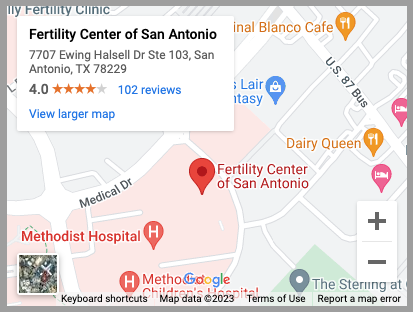Discover Your Path to Parenthood Today.
Regulate Your Reproductive System with Hormone Testing
Hormones are a regulatory substance produced by your body to stimulate specific cells and tissues into action. In the case of fertility, male and female hormones play a major role in becoming pregnant. Hormone testing at our San Antonio fertility center can help our reproductive assistance experts, Drs. Martin, Neal, Retzloff and Adams, determine if hormone treatments can help increase your chances of successfully conceiving a child. To find out more about if you or your partner’s hormones are affecting your ability to conceive, contact us today and schedule a consultation at our practice.
Hormone Testing for Men
Contrary to popular belief, infertility is not exclusively a female problem. The truth is that more than one-third of couples who are unable to conceive are experiencing male infertility, and a hormonal imbalance is often to blame. Infertility in men is typically due to issues with semen and sperm potency, including low sperm count, poor motility, and an excess of deformed or ineffective sperm. Male hormone testing and treatment can help generate a proper balance between a man’s reproductive hormones. These tests measure:
- Testosterone, which is produced by the testes to stimulate sperm formation and motility.
- Follicle stimulating hormone (FSH), which stimulates the production of sperm.
- Luteinizing hormone (LH), which stimulates the testes to produce testosterone.
Our diagnostic laboratory can help us pinpoint whether a problem with the male’s hormones is present, and which appropriate course of action should be recommended.
Hormone Testing for Women
Every month, a woman’s hormones prepare her body for conception, and irregularities in her menstrual cycle may indicate a hormonal imbalance that can affect her chances of becoming pregnant. Some hormones related to female fertility include:
- Estrogen, the hormone largely responsible for the development of the membrane that lines the uterus (endometrium).
- Progesterone, a hormone produced after ovulation that is critical to implantation.
- Androgens, produced in small amounts by the ovaries and adrenal glands.
- Prolactin, a hormone that can lead to numerous reproductive dysfunctions if produced in excess.
- FSH, which stimulates follicles within the ovaries to produce estrogen and small amounts of progesterone.
- Anti mullerian hormone (AMH), which reflects the amount of healthy, recruitable eggs (ovarian reserve).
This type of imbalance may also be discovered during a routine physical examination or through hormone testing.
Hormone Treatments and Other Procedures
Hormone testing is often an invaluable way to determine the cause of a couple’s infertility. However, hormones are not the only reason for infertility, and helping you conceive may require different tests. With a wide assortment of diagnostic techniques and assisted reproductive methods, Drs. Martin, Neal, Retzloff and Adams can create a custom treatment or combination of treatments that maximize your and your partner’s potential to reproduce.
Seek Help from the Experts
Trying and failing to become pregnant can be discouraging, but our goal is to help couples find hope through innovative and successful reproductive assistance. The first step to success is to determine the cause of infertility, and hormone testing often provides the answer for effective treatment. To schedule a consultation, contact the Fertility Center of San Antonio today.











